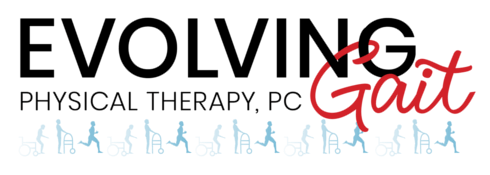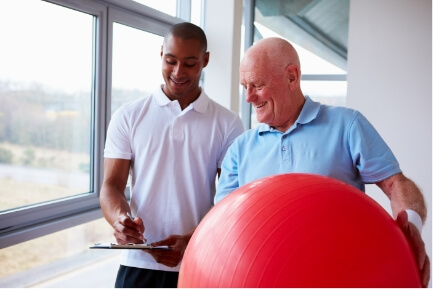Taking an opioid painkiller for relief when a person has arthritis, especially in a weight-bearing joint like the knee or hip, can be a great temptation. The bad news is that while an opioid can momentarily relieve pain, the patient’s bones continue to grind together, exacerbating the underlying source of the problem. That’s before you even consider opioids’ addictive properties. Rather than relying on opioids to relieve your arthritis pain, consider a chemical-free option: physical therapy.
Call our office to learn more about how working with a physical therapist can relieve your arthritis symptoms.
What is arthritis?
Arthritis is a condition that attacks the joints of the body by causing mass amounts of pain, tenderness, and inflammation. Many people falsely believe that only the elderly can be affected by this condition, but that’s not true. Anyone at any age can develop arthritis in their joints!
The good news is that you can spot the signs of arthritis and seek help with Evolving Gait Physical Therapy. Physical therapy may help to restore the use of these joints and increase your ability to move about and participate in everyday activities.
Signs of arthritis
Arthritis symptoms can be managed with the help of physical therapy. Some of the most common symptoms that arthritis sufferers have to deal with include:
- Swollen Tissues: The pain and inflammation associated with arthritis can cause tissue swelling near the impacted joint. The area surrounding the joint might feel warm to the touch.
- Grinding Sensation: Arthritis is a result of lost cartilage, the material in the joints which acts as a cushion and lubricant between bones. The loss of cartilage can make it feel as if the patient’s bones are grinding together when they move.
- Lost Mobility: An arthritic joint can restrict your range of motion, to the point where you are unable to carry out daily tasks like you used to.
- Joint Stiffness and Aches: The joints are especially stiff upon waking and may feel sensitive or painful when touched.
- Pain: Arthritic joints may hurt during or after physical movement.
Why are opioids so dangerous?
Both opioid prescription rates and deaths from opioid overdoses have quadrupled in the last two decades. Given these identical statistics, one can’t escape the obvious conclusion: Reliance on painkillers has gotten out of hand, and the consequences can be literally fatal.
In a study published by the American Physical Therapy Association, titled “Beyond Opioids: How Physical Therapy Can Transform Pain Management and Improve Health,” this issue is exhaustively analyzed. It identifies three important waves of the opioid epidemic:
- “Increases in deaths involving prescription opioids starting in 1999
- Increases in deaths involving heroin starting in 2010
- Increases in deaths involving synthetic opioids since 2013”
Beyond extreme physical risk, over-reliance on prescription painkillers can have other detrimental effects on your health. Withdrawal symptoms can be harrowing. And while you’re still using them, opioids can lead to depression, which sets up a vicious cycle of self-medicating in order to feel better emotionally as well as physically.
The Centers for Disease Control offers some frightening statistics from opioid overuse in 2011:
- “Sales of prescription painkillers to pharmacies and providers had increased 300% since 1999
- In 2010, 12 million people ages 12 and older reported using prescription painkillers “non-medically”
- More than 40 people were dying each day from overdoses involving prescription opioids”
Fortunately, as the APTA study concludes, there is a safer alternative to opioid use: physical therapy. If you have been struggling with pain or discomfort, contact us today to find out how we can resolve your issues the natural way.
Physical therapy can help you find true arthritis pain relief!
If you have been diagnosed with arthritis, you can work with a physical therapist to learn strategies that will help you manage your symptoms, without having to resort to painkillers.
Prepare to discuss your medical history with your therapist at your first meeting. You’ll be asked to describe your symptoms and how they affect your day-to-day activities.
During your first appointment, your physical therapist will likely have you do a few simple tests. The tests will vary based on which joints are suffering from arthritis.
Expect to be assessed on your strength and balance, as well as your range of motion in the afflicted joints. These tests will be used to identify how far your arthritis has progressed and to help your physical therapist create the optimal treatment plan for you.
Your arthritis treatment approach will almost definitely include manual therapy. This type of therapeutic massage can help loosen muscles and increase the range of motion in arthritic joints while also relieving stiffness and discomfort. All licensed physical therapists receive training in arthritis manual therapy.
Another aspect of your arthritis treatment will involve body mechanics. Your physical therapist will show you how to perform daily activities with the least amount of strain on your arthritic joints. This helps to prevent the grinding feeling as well as the progression of the arthritic condition.
Additional treatments for your arthritis may include:
- Posture: Your doctor will show you different methods of body mechanics that will optimize joint function and minimize pain. To relieve pressure on arthritic joints, you will also be taught ways to use the best muscles and joints.
- Education: Sometimes arthritis in the hip or knee will require the use of assistive mobility devices, such as a cane or walker. Your physical therapist will teach you the proper way to use these devices.
Exercise and weight management may be included in your physical therapy treatment plan. Your therapist may recommend aquatic exercise in a pool for joint relief depending on the location of your arthritis (as one possible example).
The goal will be to build strength in your muscles so that they can better support your weight without putting excessive strain on your arthritic joints.
Contact us today
Physical therapy can help you manage the pain of arthritis without turning to powerful opioids or other painkillers. Call our office today to schedule your first appointment with a licensed physical therapist.
Sources:
Tags: wellness, naturalpainrelief, healthytips, achesandpains, healthandwellness, PT, physicaltherapy, Health


